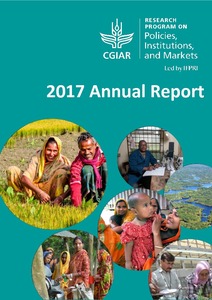Annual report 2017: CGIAR Research Program on Policies, Institutions and Markets
Abstract
Events of 2017 confirm the relevance of PIM’s research agenda. Real food prices remain well above the levels of the 1980s and 1990s, slowing progress on poverty reduction (FAO food price index). Crises due to conflict and adverse weather in 2017 put 815 million people at risk of hunger (IFPRI’s 2018 Global Food Policy Report), reversing the prior downward trend, and straining social protection and emergency relief programs. Tensions that surfaced in the international trading system seeded steps toward protectionism in agricultural markets, with negative implications for growth and food security. The US withdrawal from global commitments on climate change and reversal of regulations for environmental protection will slow attainment of global objectives. Young migrants flowing into Europe from countries with lagging job creation triggered renewed attention to agriculture’s contributions to job security as well as food security. Slow progress toward gender equality in developing countries led to increased emphasis on gender research in key development agencies and foundations in 2017. These critical issues are all germane to CGIAR’s System Level Outcomes (SLOs), and research on them from PIM’s six flagships informs the global discourse and provides diagnostic and evaluative evidence to decision makers (see Table A-1 for evidence of PIM’s contributions to the SLOs).

